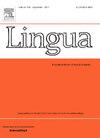传统英语中指称表达的明确性
IF 1.3
3区 文学
0 LANGUAGE & LINGUISTICS
引用次数: 0
摘要
一些关于传统说话者(HSs)多数语言(ML)的研究表明,HSs可能比单语培养的说话者(MSs)更明确。造成这种情况的一个原因可能是hs与ML的第二语言使用者(例如hs的父母)的频繁交流,这是对ML的影响尚未得到充分探讨的来源。然而,ML中的显性性尚未得到系统的解决,而且指出hs更高显性性的研究很少。为了填补这一空白,我们进行了两项研究,分析了德语、希腊语、俄语和土耳其语高频语在大多数英语中产生的指称表达,以及英语高频语在正式和非正式叙述中的表达。研究结果表明,俄语和土耳其语的ss在非正式叙述中更明确:他们比英语ms使用更多的名词头np(研究1)。这与ss的明确性源于与第二语言使用者频繁交流的推理一致,因为他们和第二语言使用者通常在非正式场合互动。然而,我们没有发现证据表明高分辨率语言在代词和空回指(研究1)或修饰指代表达(研究2)的使用中具有更高的显性性。总体而言,我们的研究结果证实了高分辨率语言在某些ML领域比MSs具有更高的显性性,尽管这种影响似乎仅限于某些现象和说话群体。本文章由计算机程序翻译,如有差异,请以英文原文为准。
Explicitness of referring expressions in heritage speakers’ majority English
Several studies on heritage speakers’ (HSs) majority language (ML) have indicated that HSs might be more explicit than monolingually-raised speakers (MSs) of this language. A reason for this might be HSs’ frequent communication with L2 speakers of the ML (e.g., HSs’ parents), which is an under-explored source of influence on the ML. However, explicitness in the ML has not been systematically addressed yet, and studies pointing to HSs’ higher explicitness are scarce.
Filling this gap, we conducted two studies analyzing referring expressions produced by German, Greek, Russian, and Turkish HSs in majority English as well as English MSs in formal and informal narratives. Results indicated that Russian and Turkish HSs were more explicit in informal narratives: they used more noun-headed NPs than English MSs (Study 1). This aligns with the reasoning that HSs’ explicitness stems from frequent communication with L2 speakers since HSs and L2 speakers usually interact in informal settings. However, we found no evidence of HSs’ higher explicitness in the use of pronouns and null anaphora (Study 1) or modified referring expressions (Study 2). Overall, our findings confirm HSs’ higher explicitness in some ML areas compared to MSs, although the effect appears limited to certain phenomena and speaker groups.
求助全文
通过发布文献求助,成功后即可免费获取论文全文。
去求助
来源期刊

Lingua
Multiple-
CiteScore
2.50
自引率
9.10%
发文量
93
审稿时长
24 weeks
期刊介绍:
Lingua publishes papers of any length, if justified, as well as review articles surveying developments in the various fields of linguistics, and occasional discussions. A considerable number of pages in each issue are devoted to critical book reviews. Lingua also publishes Lingua Franca articles consisting of provocative exchanges expressing strong opinions on central topics in linguistics; The Decade In articles which are educational articles offering the nonspecialist linguist an overview of a given area of study; and Taking up the Gauntlet special issues composed of a set number of papers examining one set of data and exploring whose theory offers the most insight with a minimal set of assumptions and a maximum of arguments.
 求助内容:
求助内容: 应助结果提醒方式:
应助结果提醒方式:


